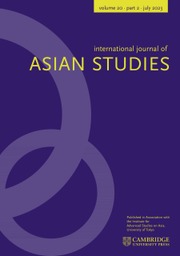No CrossRef data available.
Article contents
Utilitarianism and the question of free labor in Russia and India, in the eighteenth and nineteenth centuries
Published online by Cambridge University Press: 09 November 2020
Abstract
Liberal utilitarianism is usually presented as a current of thought mostly inspired by Jeremy Bentham and other Western European thinkers, and eventually diffused in other parts of the world. This paper adopts a different approach and shows, on the one hand, how the Bentham brothers’ experiences in Russia and serfdom in particular inspired their invention of the Panopticon. The latter was not related to deviance (Foucault's interpretation), but to labor organization and surveillance. On the other hand, the interplay between utilitarianism and colonial India led Bentham, then James and John Stuart Mill, and ultimately Henry Maine to revise utilitarianism, in particular the relationship between law, labor, and political economy. In both the Britain–Russia interplay and Britain–India interplay, the tension between universalism and particularism of philosophical, social and economic categories was at work.
- Type
- Featured Essays on the History of Political Economy in Asia and Europe
- Information
- Copyright
- Copyright © The Author(s), 2020. Published by Cambridge University Press





